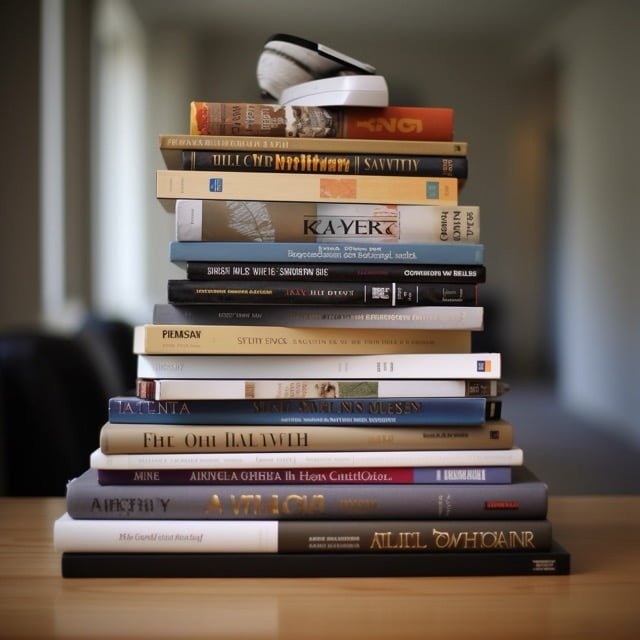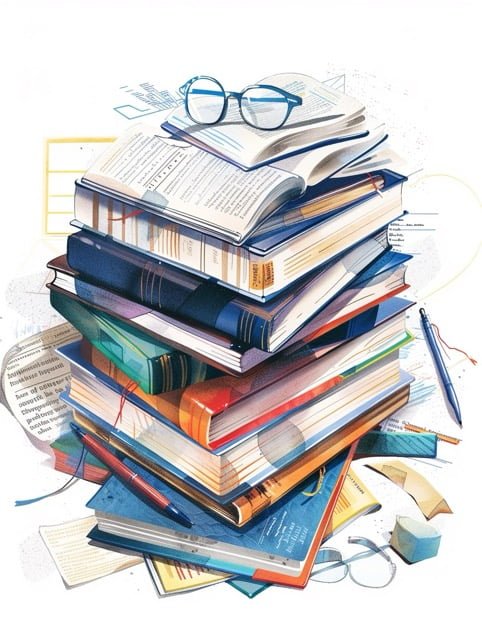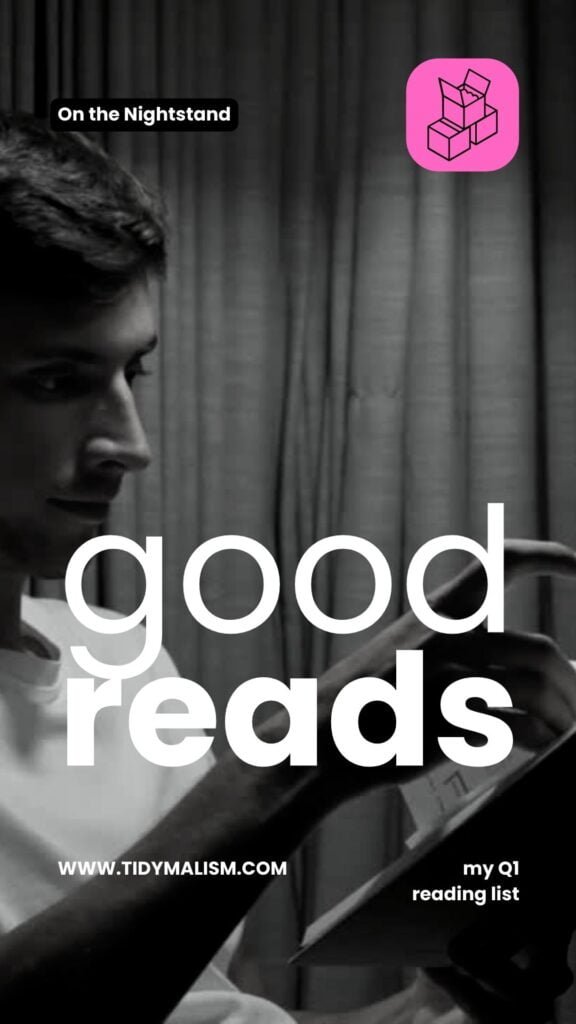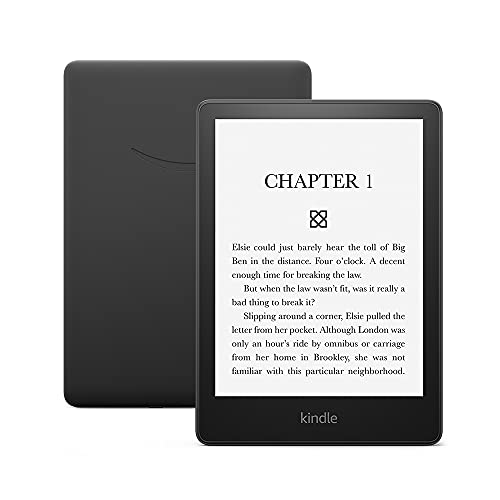I was an avid reader as a child, in young adulthood, and all throughout university into my postgraduate studies. Like everyone else though, somewhere in between then and now I got tripped up by newsgroups, forum threads, cat memes, and eventually social media.
Working in tech for over a decade at the epicentre of hellsites was the cherry on the cake. I, too, developed the attention span of a fruit fly, and I wasn’t reading very many books anymore.
That’s a terrible thing, and I’m convinced it causes the brain to turn into a glob of useless mush!
Making Reading a Daily Habit
So this year I decided to look at my phone less—like way less—and to make reading a daily habit again. Back to the minimalist reading nook it was! And since I like challenges so much, I set myself the goal of reading one book a week for the entire year.
I’ve stuck with it so far, and it’s become a time of the day I genuinely look forward to. Up until the end of the first quarter, I read a total of 15 books – two more than I had aimed for (Q1 had 13 weeks).
I did two things to make this new habit stick. For one, I banished the smartphone from my bedroom. (In fact, I banished it entirely after working hours. It now stays on my desk after work until the next day.) So instead of doomscrolling before falling asleep, I read. Bonus side effect: It makes me wonderfully drowsy and I find I’m sleeping better without the phone next to the bed.

Second, when I get up in the morning, instead of looking at my phone first thing and scrolling over coffee, I read some more. I usually begin each morning studying Hellenistic philosophy for 10-15 minutes and then I’ll read another 15 minutes of whatever book I had going the night before.
I am loving both the morning and nighttime reading routines. Plus I’ve rediscovered my Kindle. You could say I brought it back from the dead, because it’s a model from 2014. Still works great, and I’m enjoying it so much that I read every book on this list on the Kindle. If you don’t have a Kindle, get one! Probably the best hundred bucks I ever spent.
Still on the fence? Bettina from Life Organised has a great run-down of Kindle pros and cons over on her blog.

Fourteen out of the 15 books on this list are non-fiction, which is just what I’ve always been more into. You can tell right away what I’ve been obsessing with this past quarter: my freelance business, and my side hustle of content creation.
By the way, you can find many of these titles for free on Kindle Unlimited! Just follow the links to see which ones are free. Without further ado, here’s my quarterly book nook.
The Q1 Reading List
1. The Reset Factor by Dr Mindy Pelz
This was fantastic and I’m so glad I picked it up. The author, who also has a popular YouTube channel with over a million subs, offers a really comprehensive guide to detoxifying and resetting the body using ketogenic principles and fasting strategies.
Dr Pelz provides insights into how resetting your body’s health can lead to significant improvements in energy, weight loss, and overall well-being. This was the first book I read on New Year’s and right at the start of January, I put her 45-day liver detox plan into action in my own kitchen. The results have been extraordinary. So much so that I’ve pretty much stuck with this way of eating even four months later. I have so much more energy!
You don’t have to go all hardcore like me, but if you’re looking for a good cleanse, I can really recommend this book.
2. Crystals for Beginners by Karen Frazier
This is a practical guide for those new to the world of crystals, teaching readers how to select, cleanse, and utilise crystals for healing and energy work. Now, I’m just a pretty basic crystal collector so this turned out to be out of my league.
Frazier explains the significance of different crystals, their uses, and how they can impact an individual’s physical, emotional, and spiritual health. I couldn’t get into it, to be honest.
I like displaying my stones in semi-strategic feng shui locations around the flat. I keep them clean, sometimes I’ll carry one in my pocket. That’s about it for me personally. If you’re into esoteric stuff though (no judgement), you might like this book.
3. The Blog Startup by Meera Kothand
This was a really helpful read, even for a more seasoned blogger like me. The author gives a step-by-step blueprint for aspiring bloggers looking to start and grow a successful blog from scratch. I got a lot out of running through my process from this vantage point.
Kothand focuses on the initial steps of launching a blog, writing engaging content, and strategies for driving traffic and monetizing the blog. I read this right before the massive Google updates started negatively impacting all small publishers and the timing was certainly weird, but this book gave me some ideas as to how to better view Tidymalism as a product and reconsider my messaging.
4. How to Thrive on Fiverr by Michael Neidert
I run a freelance consultancy as my day job, and client work has been thin lately. That’s when I thought about offering a few smaller gigs on Fiverr, which led me to this book in search of some best practices. The author delivers.
Neidert provides actionable advice for freelancers aiming to succeed on the Fiverr platform. Covering everything from setting up a standout profile to creating compelling gig offerings, his book is a comprehensive guide to making a living and thriving on Fiverr. I still have a lot of his tips to put into action, but after reading this I feel more confident in trying out some of these freelance platforms.
5. Level Up Your Day by SJ Scott & Rebecca Livermore
I thoroughly enjoyed this book and took so many notes whilst reading. The authors focus on productivity and time management techniques that help readers make the most out of their day.
Scott and Livermore introduce habits and routines that can help you achieve more with your time, emphasising a balanced approach to work and life. They break up the daily routine into six main areas: energy, eating, exercise, routine activities, work and fun, arguing that the better you structure your day, the more flexibility and less anxiety you’ll have:
“When you engage in the same basic routine day in and day out, the anxiety that comes from not knowing what to expect is all but eliminated.”
Immediately after reading this, I created a daily, weekly, monthly and quarterly plan for myself with a structure that works way better for me. It’s not perfect yet (I’m still kind of failing in the “fun” category), but I feel like I’ve made a lot of progress already since reading this book.
6. Ich kauf nix! by Nunu Kaller
Fun fact: I’m German. So I read German books sometimes. 😅 Seeing as most of my readers are from the US and UK, I tend to not really mention the German content that comes across my screen.
This book ties in well with Tidymalism’s overall theme though, and since many English speakers have a command of German, bitteschön.
Viennese author Nunu Kaller set out on a personal challenge to avoid buying new clothes, bags, or accessories for a whole year, documenting her thought process along the way in this book, which literally translates to “I’m not buying anything!”
She explores the impacts of consumerism, fast fashion, and a new-found quest for sustainable living.
I found the first half of the book mildly annoying and self-absorbed, but she pulled herself together a bit more in the second half and provided an insightful look into the possibilities of reducing one’s ecological footprint through mindful consumption. And even though I did not enjoy her writing style, sustainability is something I can always get on board with.
7. Seven Steps to High-Income Freelancing by Lori de Milto
This was full of genuinely helpful tips for freelancers who loathe self-marketing and CRM. Lori De Milto outlines a strategic roadmap for freelancers aiming to attract better-paying clients and significantly increase their income.
Walking you through a seven-step process that includes identifying your ideal clients, effectively marketing yourself, and mastering the art of negotiation, she gives good pointers on building a successful and satisfying freelance career by leveraging your unique skills and value proposition.
8. Bloodchild by Octavia Butler
My one work of fiction in this edition of the minimalist reading nook is a short sci-fi novella. Octavia Butler explores a deeply symbiotic relationship between humans and an alien species known as the Tlic. Set on a distant planet where humans live as a protected minority, the story probes interdependence, sacrifice, and love.
Butler quite profoundly explores power dynamics, colonialism, and the negotiation of personal autonomy within inter-species relationships. I’ve personally never been a particular fan of science fiction per se, but Bloodchild was an intriguing, quick read.
9. Influencer Fast Track by Gundi Gabrielle
This book aims to guide readers through the process of building a personal brand and becoming an influencer in their niche within a short span of time. Gundi Gabrielle outlines strategies for rapid audience growth on social media platforms, content creation, and monetization. However, it’s worth noting that the digital landscape evolves rapidly, and some strategies in here now seem rather outdated.
The author herself seems less active online and some digital resources linked in the book are no longer available. To me, this underscores the importance of adapting to the ever-changing environment of online marketing and personal branding, something Gabrielle herself doesn’t seem to be doing. Who knows. Maybe she lost interest, maybe she retired. As a renaissance woman who pivoted from medicine to becoming a Carnegie Hall conductor and then online marketing, maybe she just moved on to her next great thing.
10. You Started a Blog. Now What? by Gundi Gabrielle
After reading the above “Influencer Fast Track,” I was a bit curious to read more from this author. In this guide, Gundi Gabrielle offers practical advice for new bloggers who have taken the initial step of starting a blog but are unsure of how to proceed. The book focuses on essential strategies for driving traffic, engaging readers, and monetizing content.
Gabrielle covers topics such as SEO best practices, social media marketing, and email list building, providing a roadmap for bloggers to grow their online presence and turn their blog into a successful platform. While the book aims to be a comprehensive resource for beginners, there have been a slew of changes in the world of blogging, so readers should definitely read up on the latest trends and updates in digital marketing to complement the strategies presented here.
11. Publishing: Self-Publish a Book in 30 Days by Gundi Gabrielle
Although the lack of copyediting in the previous two books made my eyes bleed, I still got some good use out of a few different tips from this author, so I decided to plow through one more of her books. I’m glad I did because this one was the best.
This book is designed as a step-by-step guide for authors looking to navigate the self-publishing process within a tight timeframe. Gabrielle outlines a detailed but manageable approach covering everything from your initial manuscript preparation to the final steps of publishing and marketing your book on Amazon.
The guide aims to demystify the self-publishing landscape, making it accessible for authors to quickly bring their work to market. While the book provides a rapid roadmap to publication, potential new authors should consider the importance of quality in writing, editing, and design to ensure their book’s success in a competitive market.
12. The Fearless Freelancer by Lori de Milto
I turned back to the same author from title #7 above in search of more freelancing tips. Lori De Milto’s “The Fearless Freelancer: How to Thrive in a Recession” equips freelancers with strategies to succeed during economic downturns. I found a few things repetitive, which the author herself freely admitted in her preface.
De Milto challenges the notion of vulnerability in freelance work, offering techniques for securing consistent work and income. Adaptability, financial planning, and the importance of a strong value proposition are some of the main foci. The book is a guide to transforming economic challenges into opportunities for growth, encouraging freelancers to refine their business models and level up their skills.
I really appreciated the free downloadable resources that were made available with this book – there were some helpful templates in the bonus pack.
13. 10 Pillars of Wealth by Alex Becker
Alex Becker’s “The 10 Pillars of Wealth” shifts focus from mere financial tactics to the mindsets and habits behind the world’s wealthiest. He advocates for a departure from traditional employment, the importance of automation, and the transition from consumer to creator.
“Don’t listen to unsuccessful people.”
Becker emphasizes self-reliance, continuous learning, and strategic risk-taking as crucial components of wealth creation. This book serves as a motivational guide that blends inspirational advice with actionable strategies for anyone aspiring to wealth through entrepreneurial endeavors.
I’m not a fan of the Twitter Bro club myself, but I kept reading because when Becker says stuff like “hurry up and get it wrong” or “learning does not get us paid,” he’s just so spot on.
14. The Wealthy Consultant by Taylor A. Welch
Welch’s “The Wealthy Consultant” offers a modern roadmap for consultants who want to turn their practice into a lucrative business. There’s lots to geek out on in here: Welch dissects the consulting industry’s landscape, identifying key strategies for differentiation, client acquisition, and scaling. Central to his approach is the concept of leveraging personal brand and specialized knowledge to attract high-value clients.
The importance of mindset shifts from traditional service provision to value-based consulting is stressed here, where results drive client fees. Welch’s book is rich with actionable insights on marketing, sales techniques, and building a consulting business that not only thrives financially but also allows for personal freedom and fulfillment.
15. 7-Figure Side Hustle by Miles Beckler
I wrapped up book number fifteen in my minimalist reading nook on the last day of March, and it’s certainly evident that work and finance were still heavily on my mind.
If you’re an online entrepreneur or into SEO at all, you’ve probably heard of Miles Beckler. In “7-Figure Side Hustle,” he demystifies the journey to creating a lucrative online business alongside a full-time job. An internet entrepreneur himself, the author shares insights from his own experiences, emphasizing the importance of leveraging digital platforms and tools to generate passive income streams. Plural!
The book outlines practical steps for identifying niche markets, building an audience, and monetizing through various online channels such as affiliate marketing, digital products, and e-commerce. Beckler stresses the power of content marketing and SEO in driving organic traffic and building a loyal customer base.
A significant focus was placed here on the actual mindset shifts necessary to overcome common pitfalls and stay motivated when faced with challenges. Even though a lot has changed in SEO since Google’s last updates, “7-Figure Side Hustle” is still a solid blueprint for anyone looking to escape the 9-to-5 grind and achieve more financial independence. Plus, the author addresses the latest changes in the SEO landscape on his YouTube channel, so in combination with his book, you’re in pretty competent hands.
Stay Tuned for Tidymalism’s Q2 Minimalist Reading Nook

Good habits stick, and as I write this post in mid-April, I’m on track to hit my reading goals again this month. Leave a comment if you’ve read any of the above. Or just leave a comment as if the blogosphere were still alive, and let us know what you’re reading these days!
Be well 🤓📚























Leave a Reply